Tourism Dynamics (Planning & Experience) - Level 5 Report, LCCA
VerifiedAdded on 2022/12/26
|14
|4399
|54
Report
AI Summary
This report provides a comprehensive analysis of tourism dynamics, focusing on planning and experience within the context of Ibiza as a case study. It explores the impact of tourism policies and principles on development, discusses the historical evolution of tourism planning, and examines current trends. The report also addresses sustainable development strategies, considering the environmental, social, and economic impacts of tourism. It delves into strategies for destination development and restructuring, offering insights into how destinations can adapt to evolving market demands. Furthermore, the report emphasizes the importance of professional presentation skills in the tourism industry. The report's structure covers tourism policy and principles, historical development of tourism planning, impacts with sustainable developments and strategies for destination restructuring and professional presentation. The report also covers the three stages of tourism policy and the changing trends in tourism planning.
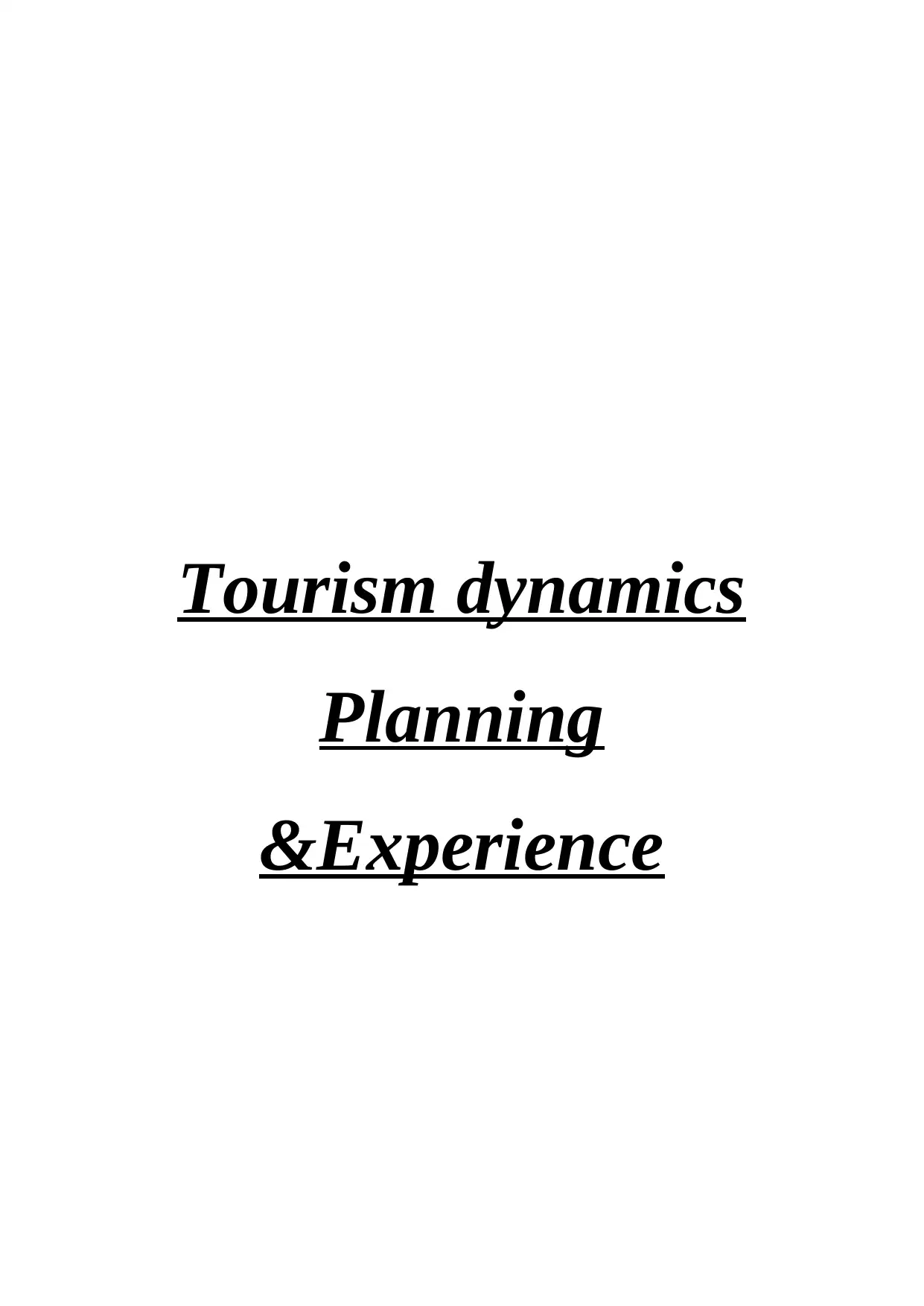
Tourism dynamics
Planning
&Experience
Planning
&Experience
Paraphrase This Document
Need a fresh take? Get an instant paraphrase of this document with our AI Paraphraser
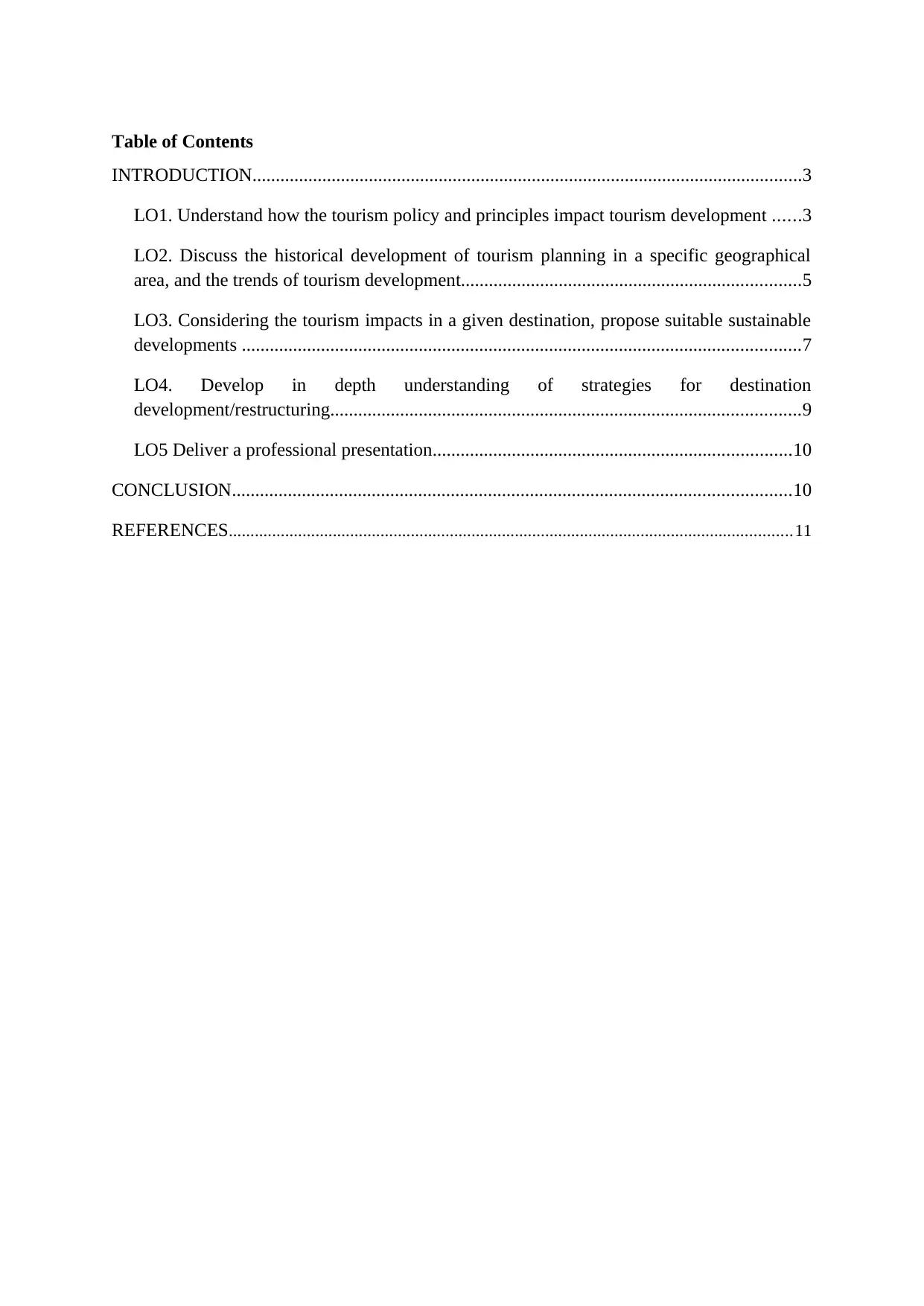
Table of Contents
INTRODUCTION......................................................................................................................3
LO1. Understand how the tourism policy and principles impact tourism development ......3
LO2. Discuss the historical development of tourism planning in a specific geographical
area, and the trends of tourism development.........................................................................5
LO3. Considering the tourism impacts in a given destination, propose suitable sustainable
developments ........................................................................................................................7
LO4. Develop in depth understanding of strategies for destination
development/restructuring.....................................................................................................9
LO5 Deliver a professional presentation.............................................................................10
CONCLUSION........................................................................................................................10
REFERENCES..................................................................................................................................11
INTRODUCTION......................................................................................................................3
LO1. Understand how the tourism policy and principles impact tourism development ......3
LO2. Discuss the historical development of tourism planning in a specific geographical
area, and the trends of tourism development.........................................................................5
LO3. Considering the tourism impacts in a given destination, propose suitable sustainable
developments ........................................................................................................................7
LO4. Develop in depth understanding of strategies for destination
development/restructuring.....................................................................................................9
LO5 Deliver a professional presentation.............................................................................10
CONCLUSION........................................................................................................................10
REFERENCES..................................................................................................................................11
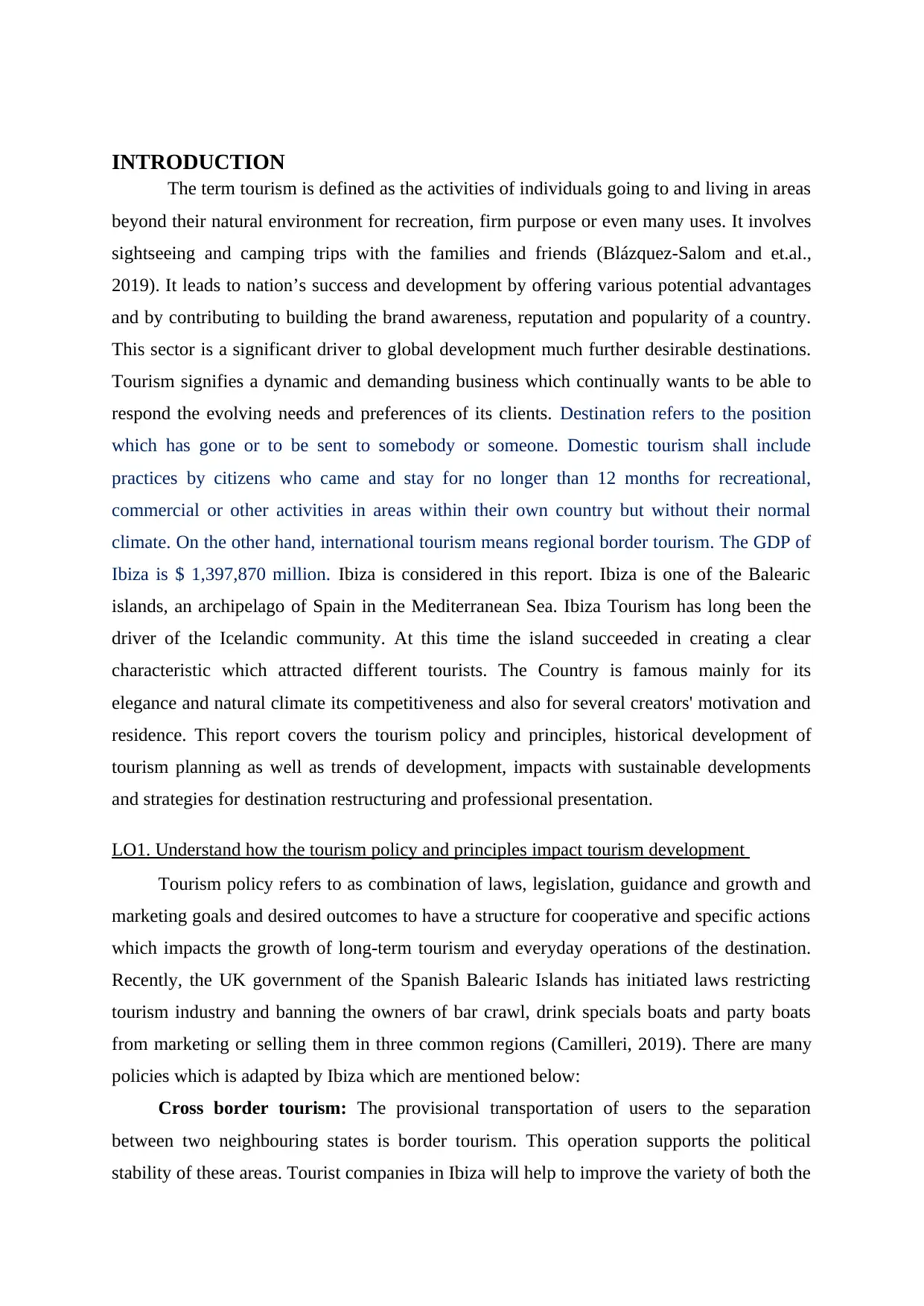
INTRODUCTION
The term tourism is defined as the activities of individuals going to and living in areas
beyond their natural environment for recreation, firm purpose or even many uses. It involves
sightseeing and camping trips with the families and friends (Blázquez-Salom and et.al.,
2019). It leads to nation’s success and development by offering various potential advantages
and by contributing to building the brand awareness, reputation and popularity of a country.
This sector is a significant driver to global development much further desirable destinations.
Tourism signifies a dynamic and demanding business which continually wants to be able to
respond the evolving needs and preferences of its clients. Destination refers to the position
which has gone or to be sent to somebody or someone. Domestic tourism shall include
practices by citizens who came and stay for no longer than 12 months for recreational,
commercial or other activities in areas within their own country but without their normal
climate. On the other hand, international tourism means regional border tourism. The GDP of
Ibiza is $ 1,397,870 million. Ibiza is considered in this report. Ibiza is one of the Balearic
islands, an archipelago of Spain in the Mediterranean Sea. Ibiza Tourism has long been the
driver of the Icelandic community. At this time the island succeeded in creating a clear
characteristic which attracted different tourists. The Country is famous mainly for its
elegance and natural climate its competitiveness and also for several creators' motivation and
residence. This report covers the tourism policy and principles, historical development of
tourism planning as well as trends of development, impacts with sustainable developments
and strategies for destination restructuring and professional presentation.
LO1. Understand how the tourism policy and principles impact tourism development
Tourism policy refers to as combination of laws, legislation, guidance and growth and
marketing goals and desired outcomes to have a structure for cooperative and specific actions
which impacts the growth of long-term tourism and everyday operations of the destination.
Recently, the UK government of the Spanish Balearic Islands has initiated laws restricting
tourism industry and banning the owners of bar crawl, drink specials boats and party boats
from marketing or selling them in three common regions (Camilleri, 2019). There are many
policies which is adapted by Ibiza which are mentioned below:
Cross border tourism: The provisional transportation of users to the separation
between two neighbouring states is border tourism. This operation supports the political
stability of these areas. Tourist companies in Ibiza will help to improve the variety of both the
The term tourism is defined as the activities of individuals going to and living in areas
beyond their natural environment for recreation, firm purpose or even many uses. It involves
sightseeing and camping trips with the families and friends (Blázquez-Salom and et.al.,
2019). It leads to nation’s success and development by offering various potential advantages
and by contributing to building the brand awareness, reputation and popularity of a country.
This sector is a significant driver to global development much further desirable destinations.
Tourism signifies a dynamic and demanding business which continually wants to be able to
respond the evolving needs and preferences of its clients. Destination refers to the position
which has gone or to be sent to somebody or someone. Domestic tourism shall include
practices by citizens who came and stay for no longer than 12 months for recreational,
commercial or other activities in areas within their own country but without their normal
climate. On the other hand, international tourism means regional border tourism. The GDP of
Ibiza is $ 1,397,870 million. Ibiza is considered in this report. Ibiza is one of the Balearic
islands, an archipelago of Spain in the Mediterranean Sea. Ibiza Tourism has long been the
driver of the Icelandic community. At this time the island succeeded in creating a clear
characteristic which attracted different tourists. The Country is famous mainly for its
elegance and natural climate its competitiveness and also for several creators' motivation and
residence. This report covers the tourism policy and principles, historical development of
tourism planning as well as trends of development, impacts with sustainable developments
and strategies for destination restructuring and professional presentation.
LO1. Understand how the tourism policy and principles impact tourism development
Tourism policy refers to as combination of laws, legislation, guidance and growth and
marketing goals and desired outcomes to have a structure for cooperative and specific actions
which impacts the growth of long-term tourism and everyday operations of the destination.
Recently, the UK government of the Spanish Balearic Islands has initiated laws restricting
tourism industry and banning the owners of bar crawl, drink specials boats and party boats
from marketing or selling them in three common regions (Camilleri, 2019). There are many
policies which is adapted by Ibiza which are mentioned below:
Cross border tourism: The provisional transportation of users to the separation
between two neighbouring states is border tourism. This operation supports the political
stability of these areas. Tourist companies in Ibiza will help to improve the variety of both the
⊘ This is a preview!⊘
Do you want full access?
Subscribe today to unlock all pages.

Trusted by 1+ million students worldwide
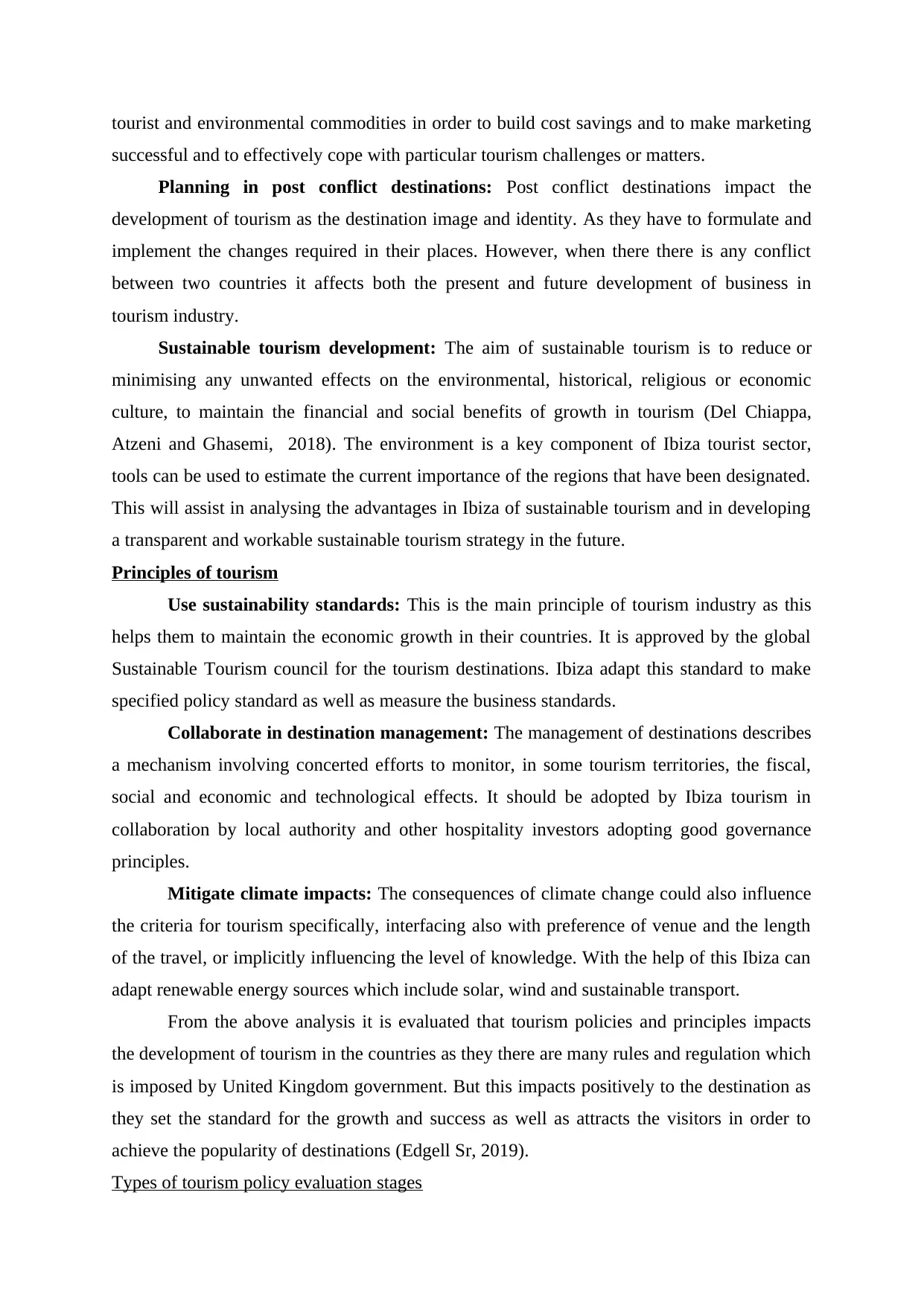
tourist and environmental commodities in order to build cost savings and to make marketing
successful and to effectively cope with particular tourism challenges or matters.
Planning in post conflict destinations: Post conflict destinations impact the
development of tourism as the destination image and identity. As they have to formulate and
implement the changes required in their places. However, when there there is any conflict
between two countries it affects both the present and future development of business in
tourism industry.
Sustainable tourism development: The aim of sustainable tourism is to reduce or
minimising any unwanted effects on the environmental, historical, religious or economic
culture, to maintain the financial and social benefits of growth in tourism (Del Chiappa,
Atzeni and Ghasemi, 2018). The environment is a key component of Ibiza tourist sector,
tools can be used to estimate the current importance of the regions that have been designated.
This will assist in analysing the advantages in Ibiza of sustainable tourism and in developing
a transparent and workable sustainable tourism strategy in the future.
Principles of tourism
Use sustainability standards: This is the main principle of tourism industry as this
helps them to maintain the economic growth in their countries. It is approved by the global
Sustainable Tourism council for the tourism destinations. Ibiza adapt this standard to make
specified policy standard as well as measure the business standards.
Collaborate in destination management: The management of destinations describes
a mechanism involving concerted efforts to monitor, in some tourism territories, the fiscal,
social and economic and technological effects. It should be adopted by Ibiza tourism in
collaboration by local authority and other hospitality investors adopting good governance
principles.
Mitigate climate impacts: The consequences of climate change could also influence
the criteria for tourism specifically, interfacing also with preference of venue and the length
of the travel, or implicitly influencing the level of knowledge. With the help of this Ibiza can
adapt renewable energy sources which include solar, wind and sustainable transport.
From the above analysis it is evaluated that tourism policies and principles impacts
the development of tourism in the countries as they there are many rules and regulation which
is imposed by United Kingdom government. But this impacts positively to the destination as
they set the standard for the growth and success as well as attracts the visitors in order to
achieve the popularity of destinations (Edgell Sr, 2019).
Types of tourism policy evaluation stages
successful and to effectively cope with particular tourism challenges or matters.
Planning in post conflict destinations: Post conflict destinations impact the
development of tourism as the destination image and identity. As they have to formulate and
implement the changes required in their places. However, when there there is any conflict
between two countries it affects both the present and future development of business in
tourism industry.
Sustainable tourism development: The aim of sustainable tourism is to reduce or
minimising any unwanted effects on the environmental, historical, religious or economic
culture, to maintain the financial and social benefits of growth in tourism (Del Chiappa,
Atzeni and Ghasemi, 2018). The environment is a key component of Ibiza tourist sector,
tools can be used to estimate the current importance of the regions that have been designated.
This will assist in analysing the advantages in Ibiza of sustainable tourism and in developing
a transparent and workable sustainable tourism strategy in the future.
Principles of tourism
Use sustainability standards: This is the main principle of tourism industry as this
helps them to maintain the economic growth in their countries. It is approved by the global
Sustainable Tourism council for the tourism destinations. Ibiza adapt this standard to make
specified policy standard as well as measure the business standards.
Collaborate in destination management: The management of destinations describes
a mechanism involving concerted efforts to monitor, in some tourism territories, the fiscal,
social and economic and technological effects. It should be adopted by Ibiza tourism in
collaboration by local authority and other hospitality investors adopting good governance
principles.
Mitigate climate impacts: The consequences of climate change could also influence
the criteria for tourism specifically, interfacing also with preference of venue and the length
of the travel, or implicitly influencing the level of knowledge. With the help of this Ibiza can
adapt renewable energy sources which include solar, wind and sustainable transport.
From the above analysis it is evaluated that tourism policies and principles impacts
the development of tourism in the countries as they there are many rules and regulation which
is imposed by United Kingdom government. But this impacts positively to the destination as
they set the standard for the growth and success as well as attracts the visitors in order to
achieve the popularity of destinations (Edgell Sr, 2019).
Types of tourism policy evaluation stages
Paraphrase This Document
Need a fresh take? Get an instant paraphrase of this document with our AI Paraphraser
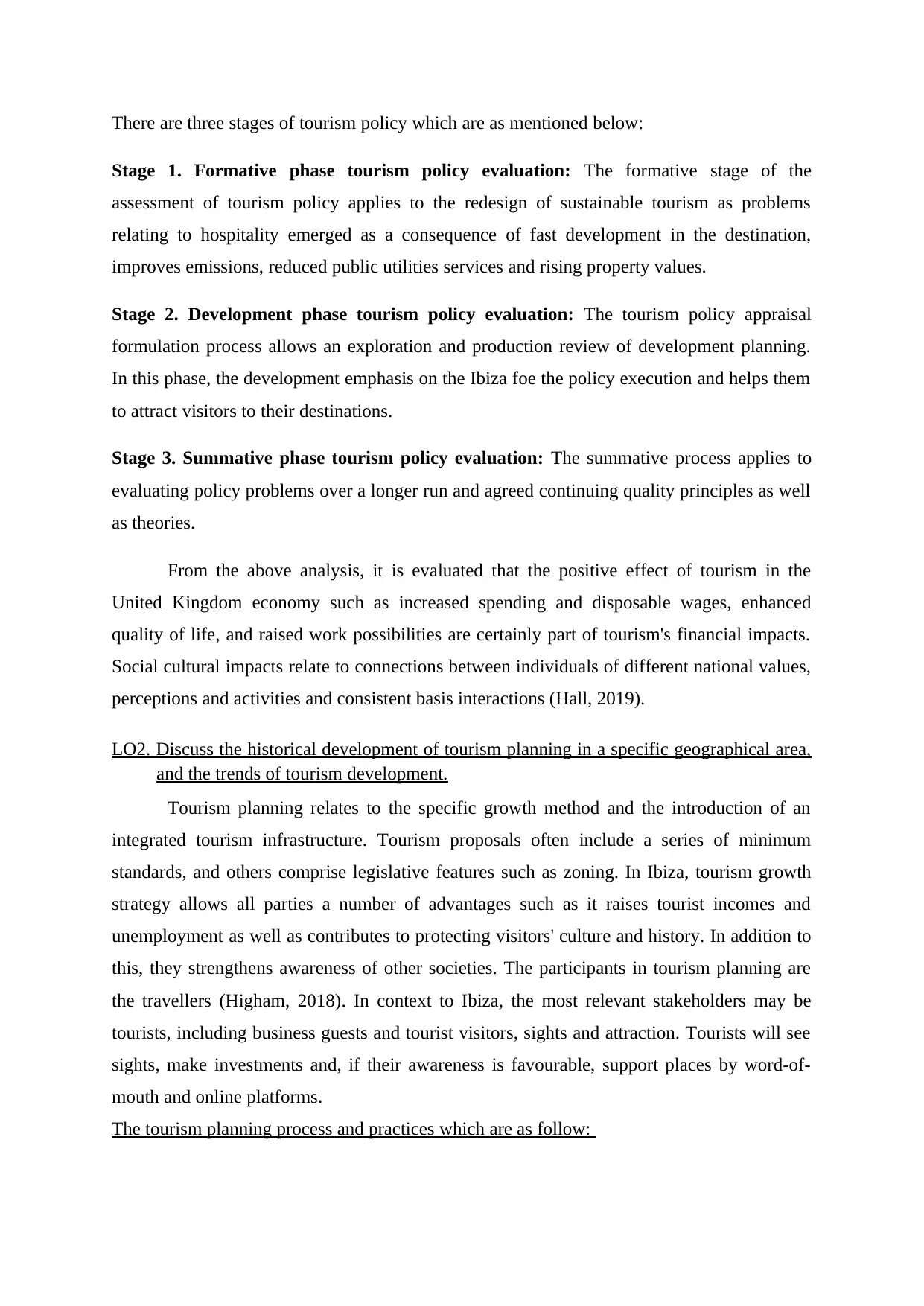
There are three stages of tourism policy which are as mentioned below:
Stage 1. Formative phase tourism policy evaluation: The formative stage of the
assessment of tourism policy applies to the redesign of sustainable tourism as problems
relating to hospitality emerged as a consequence of fast development in the destination,
improves emissions, reduced public utilities services and rising property values.
Stage 2. Development phase tourism policy evaluation: The tourism policy appraisal
formulation process allows an exploration and production review of development planning.
In this phase, the development emphasis on the Ibiza foe the policy execution and helps them
to attract visitors to their destinations.
Stage 3. Summative phase tourism policy evaluation: The summative process applies to
evaluating policy problems over a longer run and agreed continuing quality principles as well
as theories.
From the above analysis, it is evaluated that the positive effect of tourism in the
United Kingdom economy such as increased spending and disposable wages, enhanced
quality of life, and raised work possibilities are certainly part of tourism's financial impacts.
Social cultural impacts relate to connections between individuals of different national values,
perceptions and activities and consistent basis interactions (Hall, 2019).
LO2. Discuss the historical development of tourism planning in a specific geographical area,
and the trends of tourism development.
Tourism planning relates to the specific growth method and the introduction of an
integrated tourism infrastructure. Tourism proposals often include a series of minimum
standards, and others comprise legislative features such as zoning. In Ibiza, tourism growth
strategy allows all parties a number of advantages such as it raises tourist incomes and
unemployment as well as contributes to protecting visitors' culture and history. In addition to
this, they strengthens awareness of other societies. The participants in tourism planning are
the travellers (Higham, 2018). In context to Ibiza, the most relevant stakeholders may be
tourists, including business guests and tourist visitors, sights and attraction. Tourists will see
sights, make investments and, if their awareness is favourable, support places by word-of-
mouth and online platforms.
The tourism planning process and practices which are as follow:
Stage 1. Formative phase tourism policy evaluation: The formative stage of the
assessment of tourism policy applies to the redesign of sustainable tourism as problems
relating to hospitality emerged as a consequence of fast development in the destination,
improves emissions, reduced public utilities services and rising property values.
Stage 2. Development phase tourism policy evaluation: The tourism policy appraisal
formulation process allows an exploration and production review of development planning.
In this phase, the development emphasis on the Ibiza foe the policy execution and helps them
to attract visitors to their destinations.
Stage 3. Summative phase tourism policy evaluation: The summative process applies to
evaluating policy problems over a longer run and agreed continuing quality principles as well
as theories.
From the above analysis, it is evaluated that the positive effect of tourism in the
United Kingdom economy such as increased spending and disposable wages, enhanced
quality of life, and raised work possibilities are certainly part of tourism's financial impacts.
Social cultural impacts relate to connections between individuals of different national values,
perceptions and activities and consistent basis interactions (Hall, 2019).
LO2. Discuss the historical development of tourism planning in a specific geographical area,
and the trends of tourism development.
Tourism planning relates to the specific growth method and the introduction of an
integrated tourism infrastructure. Tourism proposals often include a series of minimum
standards, and others comprise legislative features such as zoning. In Ibiza, tourism growth
strategy allows all parties a number of advantages such as it raises tourist incomes and
unemployment as well as contributes to protecting visitors' culture and history. In addition to
this, they strengthens awareness of other societies. The participants in tourism planning are
the travellers (Higham, 2018). In context to Ibiza, the most relevant stakeholders may be
tourists, including business guests and tourist visitors, sights and attraction. Tourists will see
sights, make investments and, if their awareness is favourable, support places by word-of-
mouth and online platforms.
The tourism planning process and practices which are as follow:
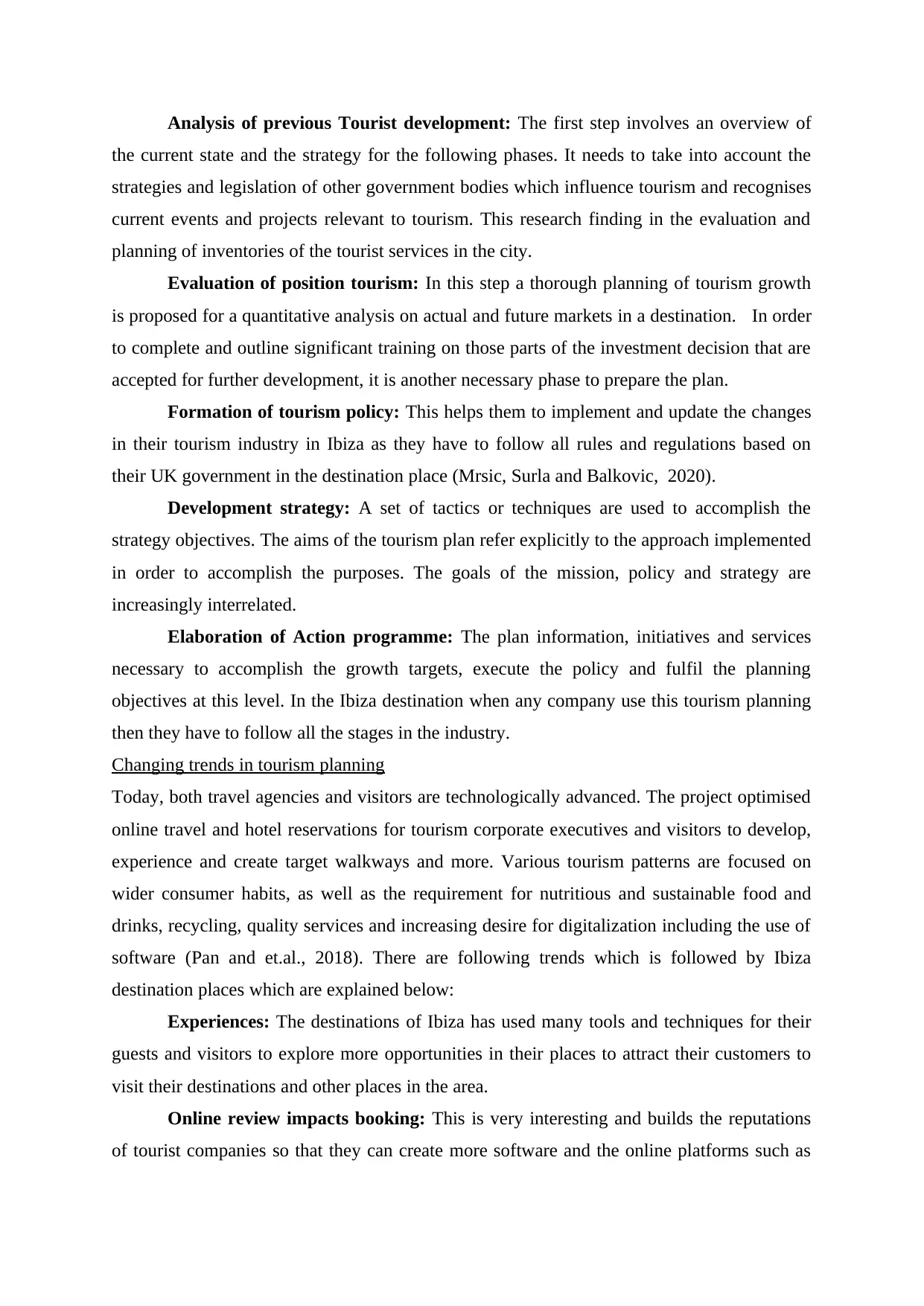
Analysis of previous Tourist development: The first step involves an overview of
the current state and the strategy for the following phases. It needs to take into account the
strategies and legislation of other government bodies which influence tourism and recognises
current events and projects relevant to tourism. This research finding in the evaluation and
planning of inventories of the tourist services in the city.
Evaluation of position tourism: In this step a thorough planning of tourism growth
is proposed for a quantitative analysis on actual and future markets in a destination. In order
to complete and outline significant training on those parts of the investment decision that are
accepted for further development, it is another necessary phase to prepare the plan.
Formation of tourism policy: This helps them to implement and update the changes
in their tourism industry in Ibiza as they have to follow all rules and regulations based on
their UK government in the destination place (Mrsic, Surla and Balkovic, 2020).
Development strategy: A set of tactics or techniques are used to accomplish the
strategy objectives. The aims of the tourism plan refer explicitly to the approach implemented
in order to accomplish the purposes. The goals of the mission, policy and strategy are
increasingly interrelated.
Elaboration of Action programme: The plan information, initiatives and services
necessary to accomplish the growth targets, execute the policy and fulfil the planning
objectives at this level. In the Ibiza destination when any company use this tourism planning
then they have to follow all the stages in the industry.
Changing trends in tourism planning
Today, both travel agencies and visitors are technologically advanced. The project optimised
online travel and hotel reservations for tourism corporate executives and visitors to develop,
experience and create target walkways and more. Various tourism patterns are focused on
wider consumer habits, as well as the requirement for nutritious and sustainable food and
drinks, recycling, quality services and increasing desire for digitalization including the use of
software (Pan and et.al., 2018). There are following trends which is followed by Ibiza
destination places which are explained below:
Experiences: The destinations of Ibiza has used many tools and techniques for their
guests and visitors to explore more opportunities in their places to attract their customers to
visit their destinations and other places in the area.
Online review impacts booking: This is very interesting and builds the reputations
of tourist companies so that they can create more software and the online platforms such as
the current state and the strategy for the following phases. It needs to take into account the
strategies and legislation of other government bodies which influence tourism and recognises
current events and projects relevant to tourism. This research finding in the evaluation and
planning of inventories of the tourist services in the city.
Evaluation of position tourism: In this step a thorough planning of tourism growth
is proposed for a quantitative analysis on actual and future markets in a destination. In order
to complete and outline significant training on those parts of the investment decision that are
accepted for further development, it is another necessary phase to prepare the plan.
Formation of tourism policy: This helps them to implement and update the changes
in their tourism industry in Ibiza as they have to follow all rules and regulations based on
their UK government in the destination place (Mrsic, Surla and Balkovic, 2020).
Development strategy: A set of tactics or techniques are used to accomplish the
strategy objectives. The aims of the tourism plan refer explicitly to the approach implemented
in order to accomplish the purposes. The goals of the mission, policy and strategy are
increasingly interrelated.
Elaboration of Action programme: The plan information, initiatives and services
necessary to accomplish the growth targets, execute the policy and fulfil the planning
objectives at this level. In the Ibiza destination when any company use this tourism planning
then they have to follow all the stages in the industry.
Changing trends in tourism planning
Today, both travel agencies and visitors are technologically advanced. The project optimised
online travel and hotel reservations for tourism corporate executives and visitors to develop,
experience and create target walkways and more. Various tourism patterns are focused on
wider consumer habits, as well as the requirement for nutritious and sustainable food and
drinks, recycling, quality services and increasing desire for digitalization including the use of
software (Pan and et.al., 2018). There are following trends which is followed by Ibiza
destination places which are explained below:
Experiences: The destinations of Ibiza has used many tools and techniques for their
guests and visitors to explore more opportunities in their places to attract their customers to
visit their destinations and other places in the area.
Online review impacts booking: This is very interesting and builds the reputations
of tourist companies so that they can create more software and the online platforms such as
⊘ This is a preview!⊘
Do you want full access?
Subscribe today to unlock all pages.

Trusted by 1+ million students worldwide
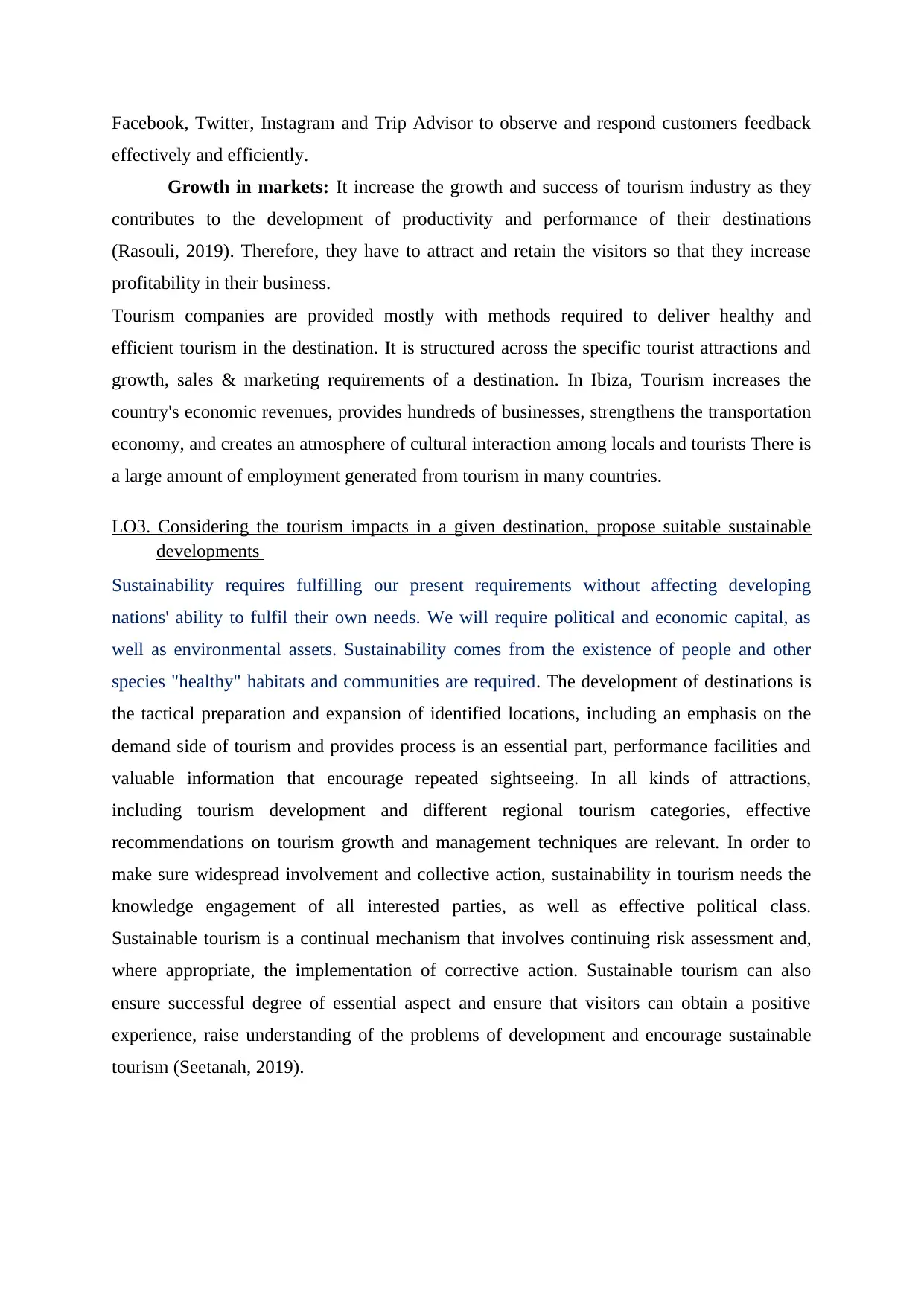
Facebook, Twitter, Instagram and Trip Advisor to observe and respond customers feedback
effectively and efficiently.
Growth in markets: It increase the growth and success of tourism industry as they
contributes to the development of productivity and performance of their destinations
(Rasouli, 2019). Therefore, they have to attract and retain the visitors so that they increase
profitability in their business.
Tourism companies are provided mostly with methods required to deliver healthy and
efficient tourism in the destination. It is structured across the specific tourist attractions and
growth, sales & marketing requirements of a destination. In Ibiza, Tourism increases the
country's economic revenues, provides hundreds of businesses, strengthens the transportation
economy, and creates an atmosphere of cultural interaction among locals and tourists There is
a large amount of employment generated from tourism in many countries.
LO3. Considering the tourism impacts in a given destination, propose suitable sustainable
developments
Sustainability requires fulfilling our present requirements without affecting developing
nations' ability to fulfil their own needs. We will require political and economic capital, as
well as environmental assets. Sustainability comes from the existence of people and other
species "healthy" habitats and communities are required. The development of destinations is
the tactical preparation and expansion of identified locations, including an emphasis on the
demand side of tourism and provides process is an essential part, performance facilities and
valuable information that encourage repeated sightseeing. In all kinds of attractions,
including tourism development and different regional tourism categories, effective
recommendations on tourism growth and management techniques are relevant. In order to
make sure widespread involvement and collective action, sustainability in tourism needs the
knowledge engagement of all interested parties, as well as effective political class.
Sustainable tourism is a continual mechanism that involves continuing risk assessment and,
where appropriate, the implementation of corrective action. Sustainable tourism can also
ensure successful degree of essential aspect and ensure that visitors can obtain a positive
experience, raise understanding of the problems of development and encourage sustainable
tourism (Seetanah, 2019).
effectively and efficiently.
Growth in markets: It increase the growth and success of tourism industry as they
contributes to the development of productivity and performance of their destinations
(Rasouli, 2019). Therefore, they have to attract and retain the visitors so that they increase
profitability in their business.
Tourism companies are provided mostly with methods required to deliver healthy and
efficient tourism in the destination. It is structured across the specific tourist attractions and
growth, sales & marketing requirements of a destination. In Ibiza, Tourism increases the
country's economic revenues, provides hundreds of businesses, strengthens the transportation
economy, and creates an atmosphere of cultural interaction among locals and tourists There is
a large amount of employment generated from tourism in many countries.
LO3. Considering the tourism impacts in a given destination, propose suitable sustainable
developments
Sustainability requires fulfilling our present requirements without affecting developing
nations' ability to fulfil their own needs. We will require political and economic capital, as
well as environmental assets. Sustainability comes from the existence of people and other
species "healthy" habitats and communities are required. The development of destinations is
the tactical preparation and expansion of identified locations, including an emphasis on the
demand side of tourism and provides process is an essential part, performance facilities and
valuable information that encourage repeated sightseeing. In all kinds of attractions,
including tourism development and different regional tourism categories, effective
recommendations on tourism growth and management techniques are relevant. In order to
make sure widespread involvement and collective action, sustainability in tourism needs the
knowledge engagement of all interested parties, as well as effective political class.
Sustainable tourism is a continual mechanism that involves continuing risk assessment and,
where appropriate, the implementation of corrective action. Sustainable tourism can also
ensure successful degree of essential aspect and ensure that visitors can obtain a positive
experience, raise understanding of the problems of development and encourage sustainable
tourism (Seetanah, 2019).
Paraphrase This Document
Need a fresh take? Get an instant paraphrase of this document with our AI Paraphraser
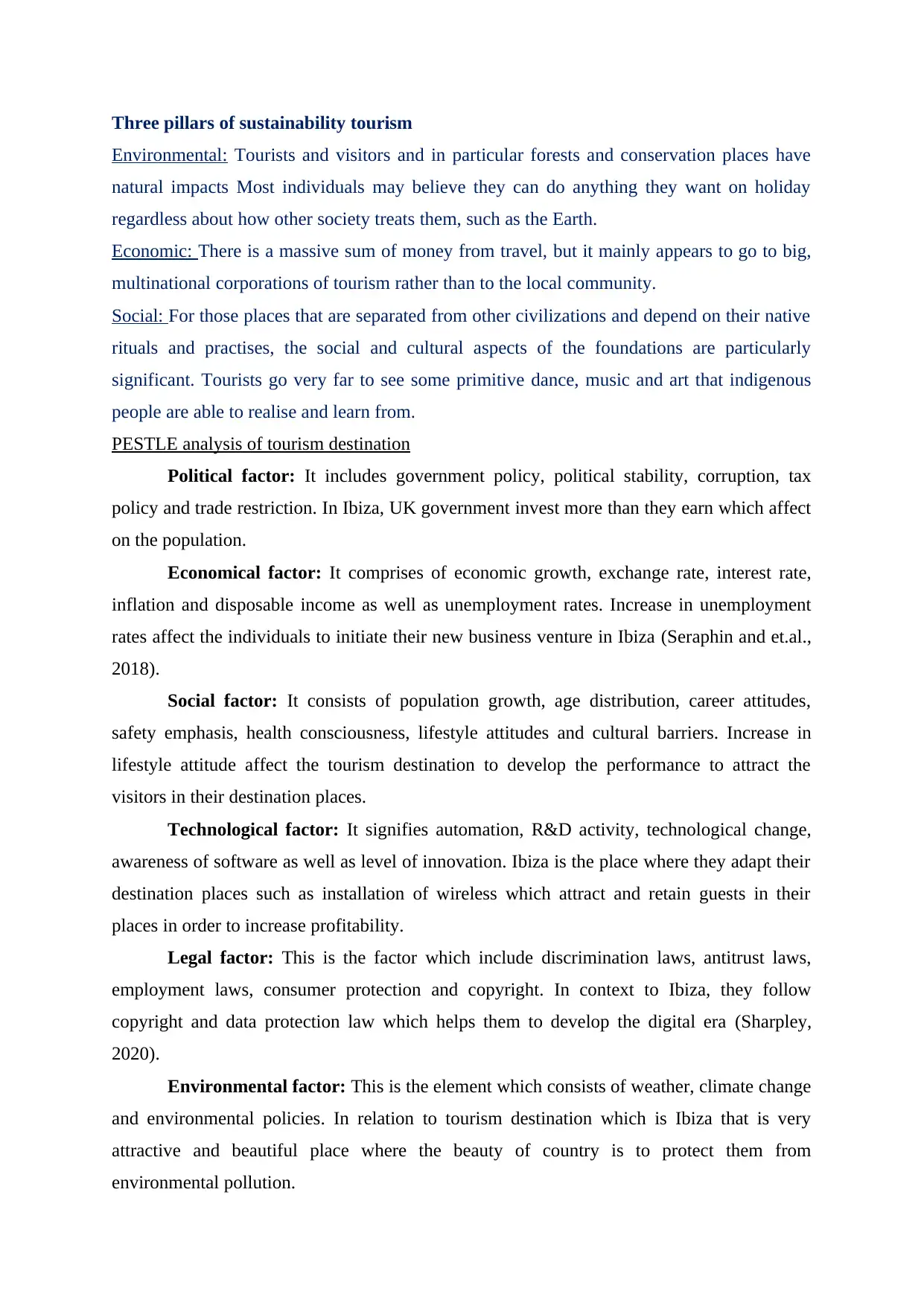
Three pillars of sustainability tourism
Environmental: Tourists and visitors and in particular forests and conservation places have
natural impacts Most individuals may believe they can do anything they want on holiday
regardless about how other society treats them, such as the Earth.
Economic: There is a massive sum of money from travel, but it mainly appears to go to big,
multinational corporations of tourism rather than to the local community.
Social: For those places that are separated from other civilizations and depend on their native
rituals and practises, the social and cultural aspects of the foundations are particularly
significant. Tourists go very far to see some primitive dance, music and art that indigenous
people are able to realise and learn from.
PESTLE analysis of tourism destination
Political factor: It includes government policy, political stability, corruption, tax
policy and trade restriction. In Ibiza, UK government invest more than they earn which affect
on the population.
Economical factor: It comprises of economic growth, exchange rate, interest rate,
inflation and disposable income as well as unemployment rates. Increase in unemployment
rates affect the individuals to initiate their new business venture in Ibiza (Seraphin and et.al.,
2018).
Social factor: It consists of population growth, age distribution, career attitudes,
safety emphasis, health consciousness, lifestyle attitudes and cultural barriers. Increase in
lifestyle attitude affect the tourism destination to develop the performance to attract the
visitors in their destination places.
Technological factor: It signifies automation, R&D activity, technological change,
awareness of software as well as level of innovation. Ibiza is the place where they adapt their
destination places such as installation of wireless which attract and retain guests in their
places in order to increase profitability.
Legal factor: This is the factor which include discrimination laws, antitrust laws,
employment laws, consumer protection and copyright. In context to Ibiza, they follow
copyright and data protection law which helps them to develop the digital era (Sharpley,
2020).
Environmental factor: This is the element which consists of weather, climate change
and environmental policies. In relation to tourism destination which is Ibiza that is very
attractive and beautiful place where the beauty of country is to protect them from
environmental pollution.
Environmental: Tourists and visitors and in particular forests and conservation places have
natural impacts Most individuals may believe they can do anything they want on holiday
regardless about how other society treats them, such as the Earth.
Economic: There is a massive sum of money from travel, but it mainly appears to go to big,
multinational corporations of tourism rather than to the local community.
Social: For those places that are separated from other civilizations and depend on their native
rituals and practises, the social and cultural aspects of the foundations are particularly
significant. Tourists go very far to see some primitive dance, music and art that indigenous
people are able to realise and learn from.
PESTLE analysis of tourism destination
Political factor: It includes government policy, political stability, corruption, tax
policy and trade restriction. In Ibiza, UK government invest more than they earn which affect
on the population.
Economical factor: It comprises of economic growth, exchange rate, interest rate,
inflation and disposable income as well as unemployment rates. Increase in unemployment
rates affect the individuals to initiate their new business venture in Ibiza (Seraphin and et.al.,
2018).
Social factor: It consists of population growth, age distribution, career attitudes,
safety emphasis, health consciousness, lifestyle attitudes and cultural barriers. Increase in
lifestyle attitude affect the tourism destination to develop the performance to attract the
visitors in their destination places.
Technological factor: It signifies automation, R&D activity, technological change,
awareness of software as well as level of innovation. Ibiza is the place where they adapt their
destination places such as installation of wireless which attract and retain guests in their
places in order to increase profitability.
Legal factor: This is the factor which include discrimination laws, antitrust laws,
employment laws, consumer protection and copyright. In context to Ibiza, they follow
copyright and data protection law which helps them to develop the digital era (Sharpley,
2020).
Environmental factor: This is the element which consists of weather, climate change
and environmental policies. In relation to tourism destination which is Ibiza that is very
attractive and beautiful place where the beauty of country is to protect them from
environmental pollution.
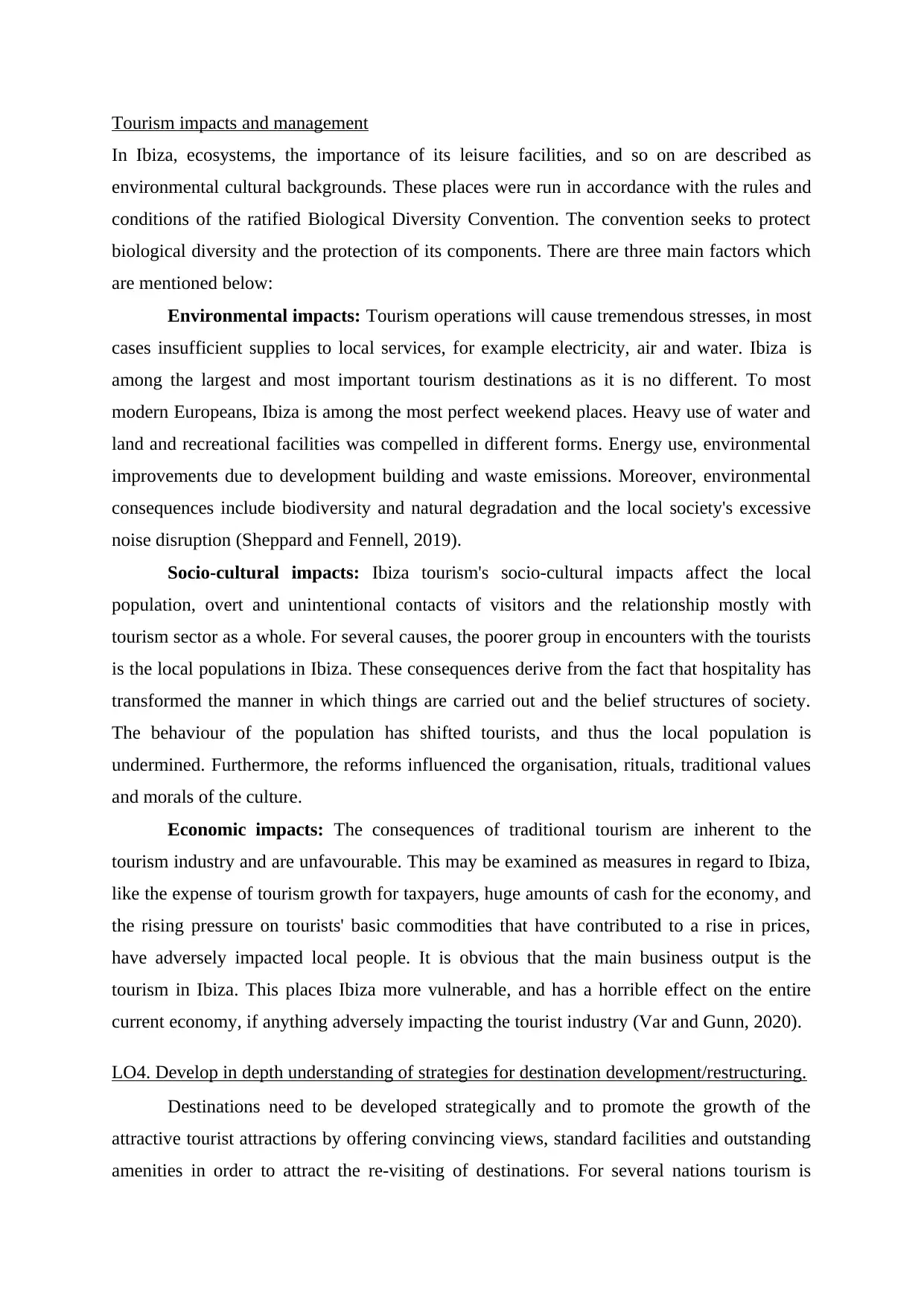
Tourism impacts and management
In Ibiza, ecosystems, the importance of its leisure facilities, and so on are described as
environmental cultural backgrounds. These places were run in accordance with the rules and
conditions of the ratified Biological Diversity Convention. The convention seeks to protect
biological diversity and the protection of its components. There are three main factors which
are mentioned below:
Environmental impacts: Tourism operations will cause tremendous stresses, in most
cases insufficient supplies to local services, for example electricity, air and water. Ibiza is
among the largest and most important tourism destinations as it is no different. To most
modern Europeans, Ibiza is among the most perfect weekend places. Heavy use of water and
land and recreational facilities was compelled in different forms. Energy use, environmental
improvements due to development building and waste emissions. Moreover, environmental
consequences include biodiversity and natural degradation and the local society's excessive
noise disruption (Sheppard and Fennell, 2019).
Socio-cultural impacts: Ibiza tourism's socio-cultural impacts affect the local
population, overt and unintentional contacts of visitors and the relationship mostly with
tourism sector as a whole. For several causes, the poorer group in encounters with the tourists
is the local populations in Ibiza. These consequences derive from the fact that hospitality has
transformed the manner in which things are carried out and the belief structures of society.
The behaviour of the population has shifted tourists, and thus the local population is
undermined. Furthermore, the reforms influenced the organisation, rituals, traditional values
and morals of the culture.
Economic impacts: The consequences of traditional tourism are inherent to the
tourism industry and are unfavourable. This may be examined as measures in regard to Ibiza,
like the expense of tourism growth for taxpayers, huge amounts of cash for the economy, and
the rising pressure on tourists' basic commodities that have contributed to a rise in prices,
have adversely impacted local people. It is obvious that the main business output is the
tourism in Ibiza. This places Ibiza more vulnerable, and has a horrible effect on the entire
current economy, if anything adversely impacting the tourist industry (Var and Gunn, 2020).
LO4. Develop in depth understanding of strategies for destination development/restructuring.
Destinations need to be developed strategically and to promote the growth of the
attractive tourist attractions by offering convincing views, standard facilities and outstanding
amenities in order to attract the re-visiting of destinations. For several nations tourism is
In Ibiza, ecosystems, the importance of its leisure facilities, and so on are described as
environmental cultural backgrounds. These places were run in accordance with the rules and
conditions of the ratified Biological Diversity Convention. The convention seeks to protect
biological diversity and the protection of its components. There are three main factors which
are mentioned below:
Environmental impacts: Tourism operations will cause tremendous stresses, in most
cases insufficient supplies to local services, for example electricity, air and water. Ibiza is
among the largest and most important tourism destinations as it is no different. To most
modern Europeans, Ibiza is among the most perfect weekend places. Heavy use of water and
land and recreational facilities was compelled in different forms. Energy use, environmental
improvements due to development building and waste emissions. Moreover, environmental
consequences include biodiversity and natural degradation and the local society's excessive
noise disruption (Sheppard and Fennell, 2019).
Socio-cultural impacts: Ibiza tourism's socio-cultural impacts affect the local
population, overt and unintentional contacts of visitors and the relationship mostly with
tourism sector as a whole. For several causes, the poorer group in encounters with the tourists
is the local populations in Ibiza. These consequences derive from the fact that hospitality has
transformed the manner in which things are carried out and the belief structures of society.
The behaviour of the population has shifted tourists, and thus the local population is
undermined. Furthermore, the reforms influenced the organisation, rituals, traditional values
and morals of the culture.
Economic impacts: The consequences of traditional tourism are inherent to the
tourism industry and are unfavourable. This may be examined as measures in regard to Ibiza,
like the expense of tourism growth for taxpayers, huge amounts of cash for the economy, and
the rising pressure on tourists' basic commodities that have contributed to a rise in prices,
have adversely impacted local people. It is obvious that the main business output is the
tourism in Ibiza. This places Ibiza more vulnerable, and has a horrible effect on the entire
current economy, if anything adversely impacting the tourist industry (Var and Gunn, 2020).
LO4. Develop in depth understanding of strategies for destination development/restructuring.
Destinations need to be developed strategically and to promote the growth of the
attractive tourist attractions by offering convincing views, standard facilities and outstanding
amenities in order to attract the re-visiting of destinations. For several nations tourism is
⊘ This is a preview!⊘
Do you want full access?
Subscribe today to unlock all pages.

Trusted by 1+ million students worldwide
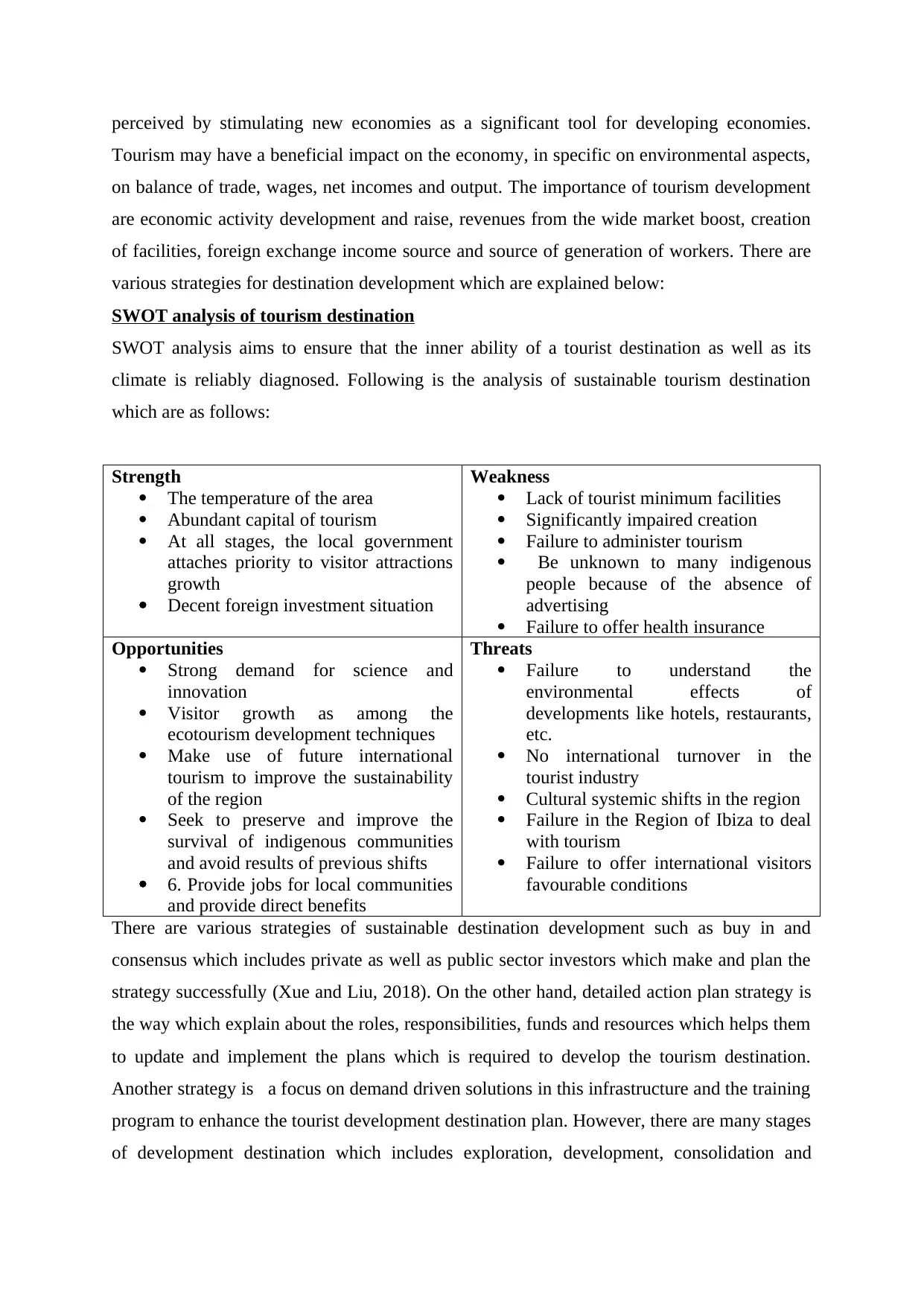
perceived by stimulating new economies as a significant tool for developing economies.
Tourism may have a beneficial impact on the economy, in specific on environmental aspects,
on balance of trade, wages, net incomes and output. The importance of tourism development
are economic activity development and raise, revenues from the wide market boost, creation
of facilities, foreign exchange income source and source of generation of workers. There are
various strategies for destination development which are explained below:
SWOT analysis of tourism destination
SWOT analysis aims to ensure that the inner ability of a tourist destination as well as its
climate is reliably diagnosed. Following is the analysis of sustainable tourism destination
which are as follows:
Strength
The temperature of the area
Abundant capital of tourism
At all stages, the local government
attaches priority to visitor attractions
growth
Decent foreign investment situation
Weakness
Lack of tourist minimum facilities
Significantly impaired creation
Failure to administer tourism
Be unknown to many indigenous
people because of the absence of
advertising
Failure to offer health insurance
Opportunities
Strong demand for science and
innovation
Visitor growth as among the
ecotourism development techniques
Make use of future international
tourism to improve the sustainability
of the region
Seek to preserve and improve the
survival of indigenous communities
and avoid results of previous shifts
6. Provide jobs for local communities
and provide direct benefits
Threats
Failure to understand the
environmental effects of
developments like hotels, restaurants,
etc.
No international turnover in the
tourist industry
Cultural systemic shifts in the region
Failure in the Region of Ibiza to deal
with tourism
Failure to offer international visitors
favourable conditions
There are various strategies of sustainable destination development such as buy in and
consensus which includes private as well as public sector investors which make and plan the
strategy successfully (Xue and Liu, 2018). On the other hand, detailed action plan strategy is
the way which explain about the roles, responsibilities, funds and resources which helps them
to update and implement the plans which is required to develop the tourism destination.
Another strategy is a focus on demand driven solutions in this infrastructure and the training
program to enhance the tourist development destination plan. However, there are many stages
of development destination which includes exploration, development, consolidation and
Tourism may have a beneficial impact on the economy, in specific on environmental aspects,
on balance of trade, wages, net incomes and output. The importance of tourism development
are economic activity development and raise, revenues from the wide market boost, creation
of facilities, foreign exchange income source and source of generation of workers. There are
various strategies for destination development which are explained below:
SWOT analysis of tourism destination
SWOT analysis aims to ensure that the inner ability of a tourist destination as well as its
climate is reliably diagnosed. Following is the analysis of sustainable tourism destination
which are as follows:
Strength
The temperature of the area
Abundant capital of tourism
At all stages, the local government
attaches priority to visitor attractions
growth
Decent foreign investment situation
Weakness
Lack of tourist minimum facilities
Significantly impaired creation
Failure to administer tourism
Be unknown to many indigenous
people because of the absence of
advertising
Failure to offer health insurance
Opportunities
Strong demand for science and
innovation
Visitor growth as among the
ecotourism development techniques
Make use of future international
tourism to improve the sustainability
of the region
Seek to preserve and improve the
survival of indigenous communities
and avoid results of previous shifts
6. Provide jobs for local communities
and provide direct benefits
Threats
Failure to understand the
environmental effects of
developments like hotels, restaurants,
etc.
No international turnover in the
tourist industry
Cultural systemic shifts in the region
Failure in the Region of Ibiza to deal
with tourism
Failure to offer international visitors
favourable conditions
There are various strategies of sustainable destination development such as buy in and
consensus which includes private as well as public sector investors which make and plan the
strategy successfully (Xue and Liu, 2018). On the other hand, detailed action plan strategy is
the way which explain about the roles, responsibilities, funds and resources which helps them
to update and implement the plans which is required to develop the tourism destination.
Another strategy is a focus on demand driven solutions in this infrastructure and the training
program to enhance the tourist development destination plan. However, there are many stages
of development destination which includes exploration, development, consolidation and
Paraphrase This Document
Need a fresh take? Get an instant paraphrase of this document with our AI Paraphraser
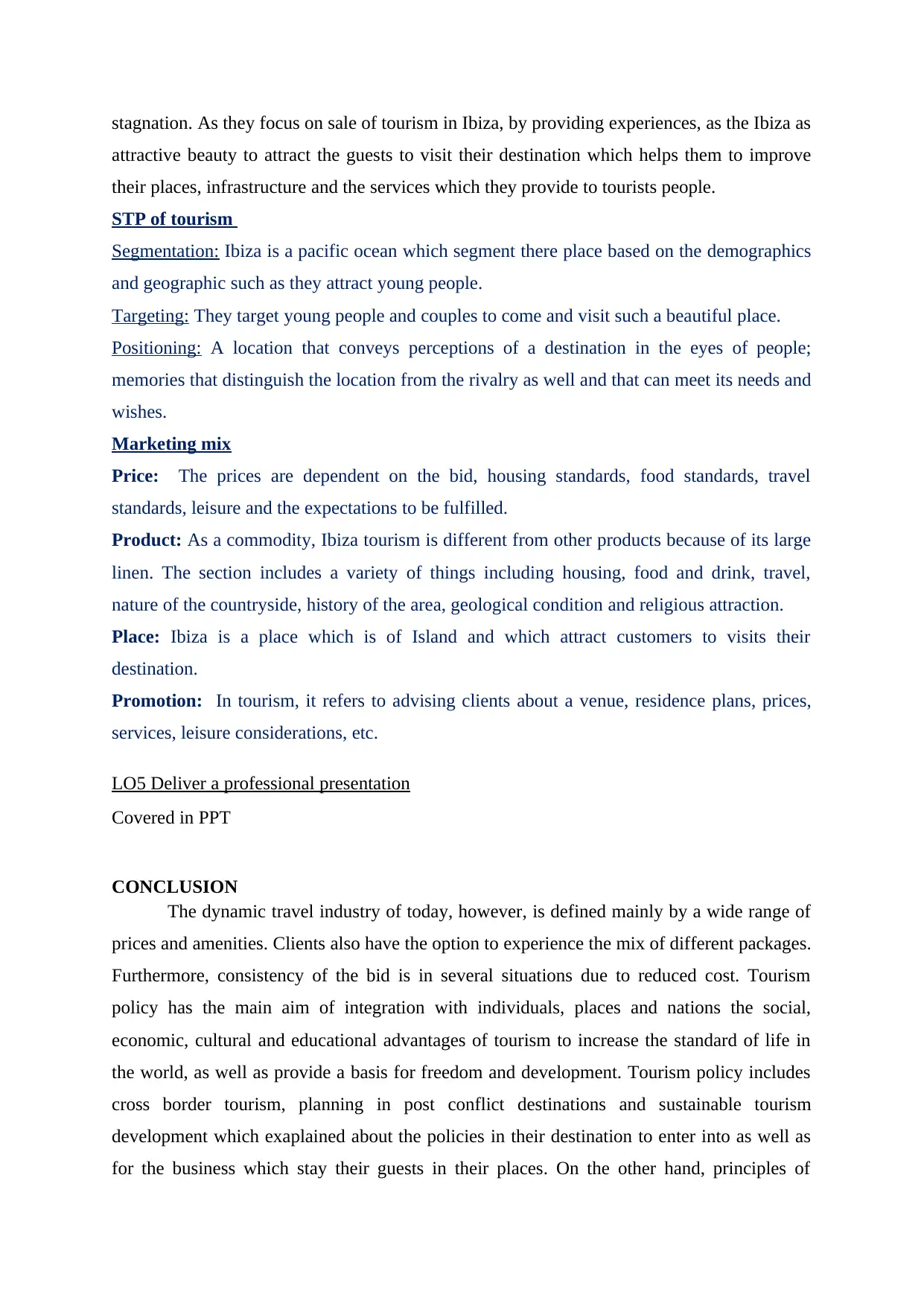
stagnation. As they focus on sale of tourism in Ibiza, by providing experiences, as the Ibiza as
attractive beauty to attract the guests to visit their destination which helps them to improve
their places, infrastructure and the services which they provide to tourists people.
STP of tourism
Segmentation: Ibiza is a pacific ocean which segment there place based on the demographics
and geographic such as they attract young people.
Targeting: They target young people and couples to come and visit such a beautiful place.
Positioning: A location that conveys perceptions of a destination in the eyes of people;
memories that distinguish the location from the rivalry as well and that can meet its needs and
wishes.
Marketing mix
Price: The prices are dependent on the bid, housing standards, food standards, travel
standards, leisure and the expectations to be fulfilled.
Product: As a commodity, Ibiza tourism is different from other products because of its large
linen. The section includes a variety of things including housing, food and drink, travel,
nature of the countryside, history of the area, geological condition and religious attraction.
Place: Ibiza is a place which is of Island and which attract customers to visits their
destination.
Promotion: In tourism, it refers to advising clients about a venue, residence plans, prices,
services, leisure considerations, etc.
LO5 Deliver a professional presentation
Covered in PPT
CONCLUSION
The dynamic travel industry of today, however, is defined mainly by a wide range of
prices and amenities. Clients also have the option to experience the mix of different packages.
Furthermore, consistency of the bid is in several situations due to reduced cost. Tourism
policy has the main aim of integration with individuals, places and nations the social,
economic, cultural and educational advantages of tourism to increase the standard of life in
the world, as well as provide a basis for freedom and development. Tourism policy includes
cross border tourism, planning in post conflict destinations and sustainable tourism
development which exaplained about the policies in their destination to enter into as well as
for the business which stay their guests in their places. On the other hand, principles of
attractive beauty to attract the guests to visit their destination which helps them to improve
their places, infrastructure and the services which they provide to tourists people.
STP of tourism
Segmentation: Ibiza is a pacific ocean which segment there place based on the demographics
and geographic such as they attract young people.
Targeting: They target young people and couples to come and visit such a beautiful place.
Positioning: A location that conveys perceptions of a destination in the eyes of people;
memories that distinguish the location from the rivalry as well and that can meet its needs and
wishes.
Marketing mix
Price: The prices are dependent on the bid, housing standards, food standards, travel
standards, leisure and the expectations to be fulfilled.
Product: As a commodity, Ibiza tourism is different from other products because of its large
linen. The section includes a variety of things including housing, food and drink, travel,
nature of the countryside, history of the area, geological condition and religious attraction.
Place: Ibiza is a place which is of Island and which attract customers to visits their
destination.
Promotion: In tourism, it refers to advising clients about a venue, residence plans, prices,
services, leisure considerations, etc.
LO5 Deliver a professional presentation
Covered in PPT
CONCLUSION
The dynamic travel industry of today, however, is defined mainly by a wide range of
prices and amenities. Clients also have the option to experience the mix of different packages.
Furthermore, consistency of the bid is in several situations due to reduced cost. Tourism
policy has the main aim of integration with individuals, places and nations the social,
economic, cultural and educational advantages of tourism to increase the standard of life in
the world, as well as provide a basis for freedom and development. Tourism policy includes
cross border tourism, planning in post conflict destinations and sustainable tourism
development which exaplained about the policies in their destination to enter into as well as
for the business which stay their guests in their places. On the other hand, principles of
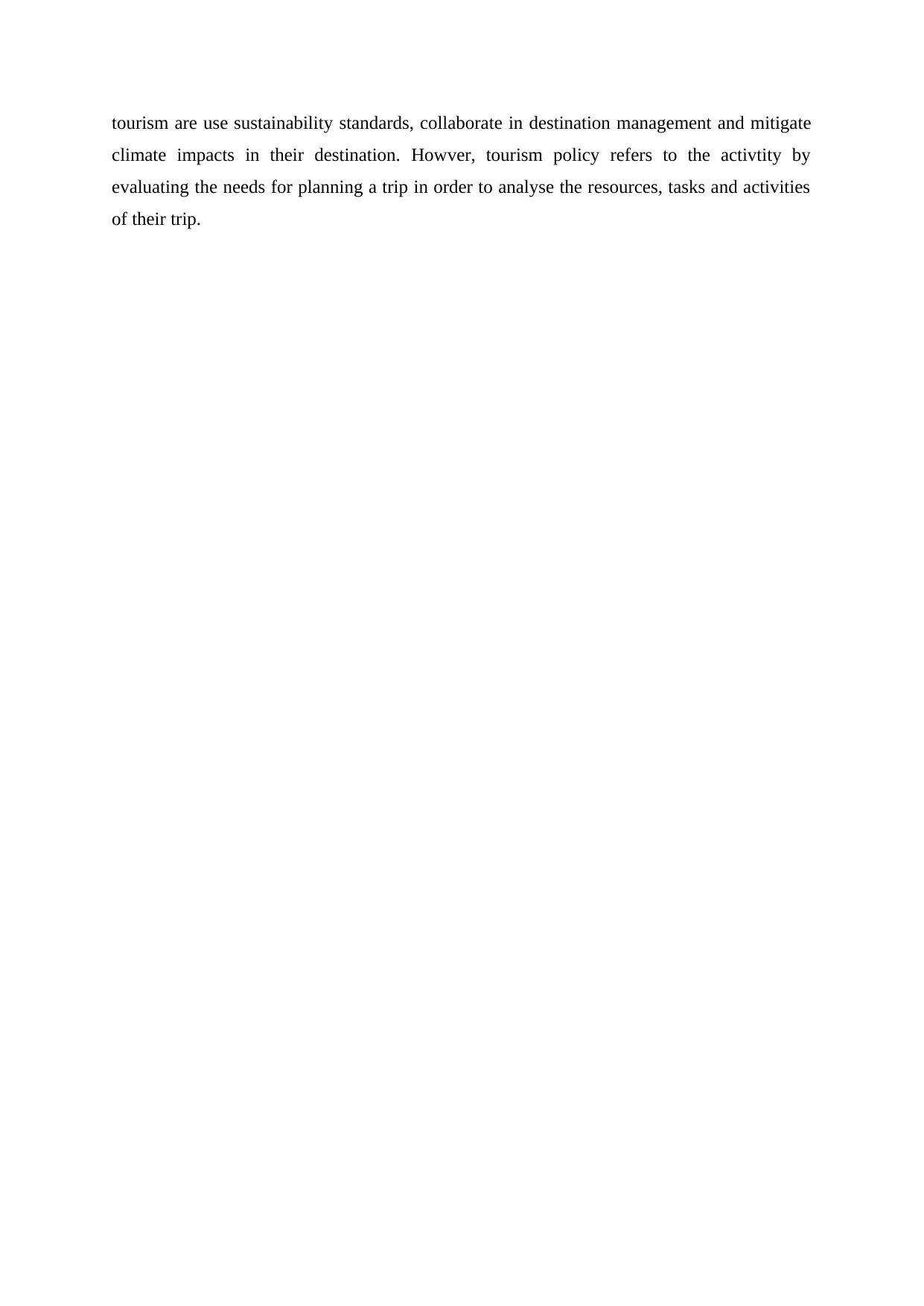
tourism are use sustainability standards, collaborate in destination management and mitigate
climate impacts in their destination. Howver, tourism policy refers to the activtity by
evaluating the needs for planning a trip in order to analyse the resources, tasks and activities
of their trip.
climate impacts in their destination. Howver, tourism policy refers to the activtity by
evaluating the needs for planning a trip in order to analyse the resources, tasks and activities
of their trip.
⊘ This is a preview!⊘
Do you want full access?
Subscribe today to unlock all pages.

Trusted by 1+ million students worldwide
1 out of 14
Related Documents
Your All-in-One AI-Powered Toolkit for Academic Success.
+13062052269
info@desklib.com
Available 24*7 on WhatsApp / Email
![[object Object]](/_next/static/media/star-bottom.7253800d.svg)
Unlock your academic potential
Copyright © 2020–2025 A2Z Services. All Rights Reserved. Developed and managed by ZUCOL.





